Edgar Allan Poe
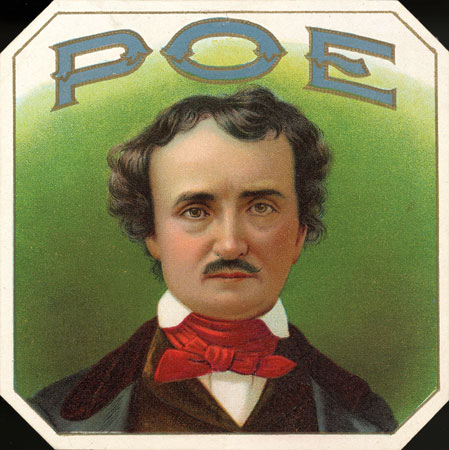
During the 40 years of his life, Edgar Allan Poe faced numerous burdens that caused him to struggle throughout his lifetime and at the same time using that experience as an element in his literature. His poetry and stories are full of dark, sorrow and dreary themes of uncertainty, since horror stems from the uncertain.
Still, Edgar Allan Poe lived a very depressingly dramatic childhood; his father abandoned him and his mother, when he was an infant, and thereafter, at age three he lost his mother. He was later adopted by a foster family, only to witness them die also. After he lost his step-mother, his greatest ally and beloved who would always support him, Poe was once again left all alone in this world, with the exception of his step-father, whom he never had a good relationship with. Even when attempting to get married to the girl he loved, he was unable to. The reason for this was because the parents of the girl found out that Edgar wasn’t going to get any of Allen’s will, and they married her to someone else. As a result, Poe became more morose since life’s harsh realities would not allow him to rejoice or have any happiness.
Finally, after years of sufferings, Poe found fulfillment in his life in the form of an everlasting bond with his cousin, his lover and wife, Victoria. Some time later, to his shock, his biggest love, his happiness, Victoria also died. What is this? Some kind of irony, or tragedy of life, or even worse. Edgar always struggled with the portion of the life that was given to him, because it was full of sorrow.
The Raven
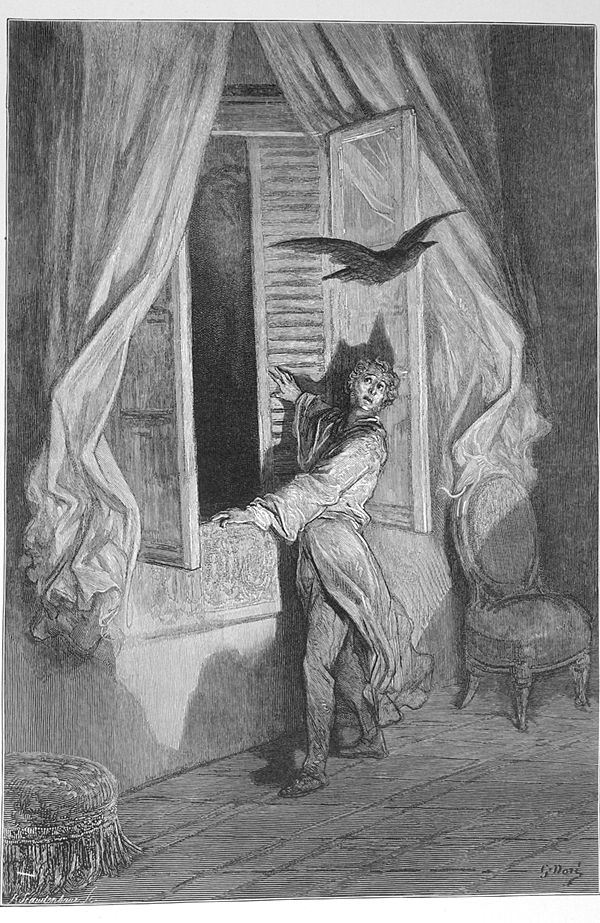
“The Raven” is a stunning read. The poem’s stylized language, musicality and supernatural atmosphere, the magic flow of the story, takes the reader far into a new reality. As the poem unfolds, an unnamed narrator, who one December midnight, sitting front of the fireplace, is reading “quaint and curious volume of forgotten lore” to find some relief and forget the loss of his love, ease the pain and the sorrow in his heart. December is a month traditionally known to be associated with the forces of darkness. While he is about to find peace, trying to fall asleep, he hears a tapping at his chamber door. What a distraction and disruption! He opens the door, there is no one, then he opens the window, a raven steps into his chamber, lends on top of the bust of Pallas, and will not leave.
At first, he says nothing, but when he remembers his lost love, Lenore, he feels the air getting denser and feels the presence of angels. He believes that the spirit of sadness is embodied in raven visited him in this cold December night. The sadness of his heart first associates with the season of the year, and finally with the raven—known as the “devil bird”. Confused by the association of the angels with the bird, the narrator becomes angry, calling the raven a “thing of evil” and a “prophet”. This devil image is emphasized by the narrator’s belief that the raven is “from the Night’s Plutonian shore”, or a messenger from the afterlife, referring to Pluto, the Roman god of the underworld. It was sent to him as a spirit of his sufferings, to hunt him. And since it appears to him as a reminder that he lost his love, and he will never have it back and will never be able to hug or feel his darling, apparently this raven is sent by the devil to torment his already disturbed life. He asks questions and yells at the raven, asks about his lost love, but the only respond that he gets, is “nevermore”. That is why he is losing himself and trying to get rid of the raven.
Poe’s usage of the raven is purely symbolic and has religious significance. Similarly, the symbol of a raven too is used in the Bible, in mythology and folklore. For example, in the Genesis story of the Bible, a raven is shown to be a bird of ill omen. This holds true within many other cultures, including my own; a bird raven symbolizes death (especially when it comes and taps the window). The theme of death is the deepest religious significance that becomes apparent in humans’ lives, hunting and scaring them like a devil. Thus, Human consciousness makes them to fear death.
Annabel Lee
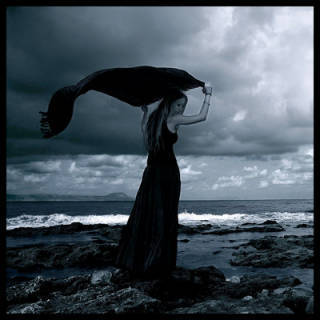
Another poem written by Edgar Allan Poe that I really liked is one of his beautiful poems, “Annabel Lee.” The poem was written two years after his beloved wife’s death, and it seems logical that it is indeed written about her and is simply embellished with a bit of poetic license. As I read the poem, it reminded me of his relationship with his cousin, and future wife, Virginia. He loved her more than anyone else in his lifetime and by losing Virginia, he resorted to alcoholism again, leading to his death. After her death he lived only 2 years more. He truly suffered her death. Even when she was sick he was already in distress. She became the inspiration for most of his writings. But as I mentioned earlier, the loss of his mother, step-mother and his wife, are all muses in his poems, whenever he uses the theme of a woman.
Like most of Poe’s poems, “Annabel Lee” touches on the theme of the death of a beautiful and beloved woman, which according to Poe is “the most poetical topic in the world.” The narrator writes about a fictional kingdom along the ocean shore. It is an idyllic, beautiful, land of enchantment–a paradise on earth–where the narrator falls in love with Annabel Lee in childhood, and it grows into a strong and ideal love which even makes the angels jealous of them: “the winged seraphs of heaven coveted her and me.” He insists that the envious angels caused the wind to chill his bride and seize her life: “the wind came out of a cloud, chilling and killing my Annabel Lee.” His assertion that angels murdered his love and bride, suggests that he is trying to diminish his own extreme feelings of loss. And he even contends, their love stronger than the love of the older or wiser couples, can never be conquered:
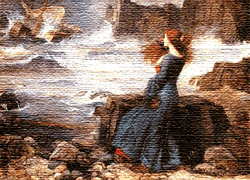
“And neither the angles in heaven above,
Nor the demons down under the sea,
Can ever dissever my soul from the soul
Of the beautiful Annabel Lee.”
As the poem continues, we see that he holds on to his love for Annabel Lee even after her death. Every night he dreams of Annabel Lee and sees the brightness of her eyes shining like stars. “And so, all the night-tide, I lie down by the side of…my life and my bride… in her tomb by the side of the sea.”
The religious significance in the poem appears from the beginning to the end. He blames the jealous God’s angels for “chilling and killing” his darling Annabel Lee. Instead of saving lives, protecting them from evil, angels became a reason of his lovely Annabel Lee’s death and their separation. However, unlike “The Raven,” in which narrator believes he will “nevermore” be reunited with his love, “Annabel Lee” says the two will be together again, as not even demons “can ever dissever” their souls.
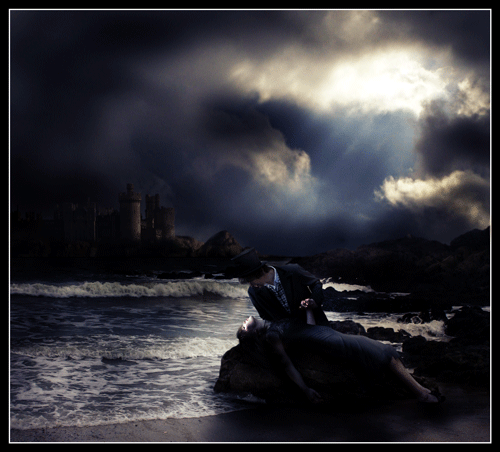
Annabel Lee
It was many and many a year ago,
In a kingdom by the sea,
That a maiden there lived whom you may know
By the name of ANNABEL LEE;
And this maiden she lived with no other thought
Than to love and be loved by me.
I was a child and she was a child,
In this kingdom by the sea;
But we loved with a love that was more than love-
I and my Annabel Lee;
With a love that the winged seraphs of heaven
Coveted her and me.
And this was the reason that, long ago,
In this kingdom by the sea,
A wind blew out of a cloud, chilling
My beautiful Annabel Lee;
So that her highborn kinsman came
And bore her away from me,
To shut her up in a sepulchre
In this kingdom by the sea.
The angels, not half so happy in heaven,
Went envying her and me-
Yes!- that was the reason (as all men know,
In this kingdom by the sea)
That the wind came out of the cloud by night,
Chilling and killing my Annabel Lee.
But our love it was stronger by far than the love
Of those who were older than we-
Of many far wiser than we-
And neither the angels in heaven above,
Nor the demons down under the sea,
Can ever dissever my soul from the soul
Of the beautiful Annabel Lee.
For the moon never beams without bringing me dreams
Of the beautiful Annabel Lee;
And the stars never rise but I feel the bright eyes
Of the beautiful Annabel Lee;
And so, all the night-tide, I lie down by the side
Of my darling- my darling- my life and my bride,
In the sepulchre there by the sea,
In her tomb by the sounding sea.